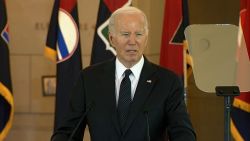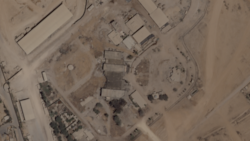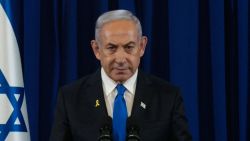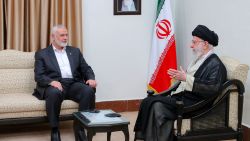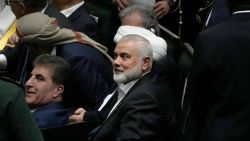President Joe Biden on Tuesday issued a call to fight a “ferocious surge” of antisemitism, saying such hate has no place in America as he connected the horrors of the Holocaust to Hamas’ attack on Israel.
Biden’s speech was a somber – yet impassioned – moment of reflection amid a tense and pivotal time in his reelection push. The October 7 attack and the subsequent war in Gaza has proved to be one of the most politically fraught periods of Biden’s presidency, one that is particularly personal for the longtime supporter of Israel who views antisemitism as antithetical to American values.
“We must give hate no safe harbor against anyone,” Biden said.
But Biden’s staunch support for Israel’s war against Hamas, which has now led to the deaths of more than 34,000 Palestinians, has caused deep fractures in the coalition that sent him to the White House in 2020. Protests on college campuses over Israel’s campaign and the Biden administration’s support for it have spread across the nation, highlighting potential political problems that the president is facing with the younger voters he needs to win a second term.
On Tuesday, during his keynote address at the US Holocaust Memorial Museum’s annual Days of Remembrance ceremony at the US Capitol, Biden sought to draw direct links between the horrors experienced by Jews under the Nazi regime to what happened in Israel last year and rising antisemitism after Hamas’ attack.
“This ancient hatred of Jews didn’t begin with the Holocaust – it didn’t end with the Holocaust, either, or even after our victory in World War II. This hatred continues to lie deep in the hearts of too many people in the world and requires our continued vigilance and outspokenness,” Biden said.
He continued, “Now, here we are – not 75 years later, but just seven and a half months later – and people are already forgetting. They’re already forgetting that Hamas unleashed this terror. … I have not forgotten, nor have you, and we will not forget.”
Biden pointed to a “ferocious surge” of antisemitism in the US in the aftermath of October 7, from propaganda on social media to Jewish students being harassed or attacked on campus.
“Too many people denying, downplaying, rationalizing and ignoring the horrors of the Holocaust and October 7 – including Hamas’ appalling use of sexual violence to torture and terrorize. It’s absolutely despicable – and it must stop,” he said, raising his voice.
The president spoke out forcefully against intensifying antisemitism and Islamophobia in the days after Hamas’ attacks on Israel, saying in an October 19 Oval Office address that Americans “can’t stand by and stand silent.” Yet in the seven months since the war began, Islamophobic and antisemitic incidents have significantly increased.
The most recent data from the Anti-Defamation League, which has tracked antisemitic incidents in the US since 1979, found a 140% increase in incidents from 2022 to 2023, with a “dramatic” increase taking place after October 7. And an ADL report on antisemitic attitudes in America in 2024 found that younger Americans are “more likely to endorse anti-Jewish tropes.”
Biden offered a direct message to American Jews Tuesday.
“I see your fear, your hurt, and your pain. Let me reassure you as your president: You are not alone. You belong. You always have and you always will,” he said.
He recounted the story of Tom Lantos, who escaped a Nazi labor camp during the Holocaust with the help of Raoul Wallenberg, a Swedish diplomat who used his diplomatic cover to hide and rescue about 100,000 Jews. Lantos became a top adviser to Biden, then a first-term senator, and later became the only Holocaust survivor elected to Congress.
The president quoted Lantos, who warned, “The veneer of civilization is paper-thin. We are its guardians, and we can never rest.”
“My fellow Americans: We must be the guardians,” Biden added.
A sensitive spot for the president
While the president has been steadfast in his condemnations of antisemitism, the war in Gaza has made for a politically perilous topic for Biden and his White House as he tries to also show empathy with the conditions Palestinians now face in Gaza.
The president has faced protests at nearly every public event outside of the White House in recent months for his support of Israel’s war against Hamas, and his handling of the war has been under intense scrutiny since the days after the October 7 attacks.
The president and his administration now face another potential tipping point in the war. The speech came as Israel’s military has issued a call for residents of the eastern part of the Gazan city of Rafah to “evacuate immediately,” raising questions about whether Israel’s long-threatened assault on the city will soon be carried out – a move that the Biden administration has strongly cautioned against.
During nearly seven months of war, more than 1 million Palestinians have fled to Rafah, where Hamas is believed to have regrouped after Israel’s destruction of much of northern Gaza. Biden and his top lieutenants have repeatedly and emphatically made clear to their Israeli counterparts that they want to see a clear plan to protect civilians before any troops enter the area. While National Security Council spokesman John Kirby told reporters Biden “again made this clear” in a Monday call with Prime Minister Benjamin Netanyahu, it’s not clear such a plan has been presented to the US.
Biden on Tuesday reiterated his “ironclad” commitment to Israel’s right to exist as an independent Jewish state – “even when we disagree.”
Hamas announced Monday that it had agreed to a ceasefire proposal brokered by the Qatari and Egyptian governments, though the proposal appeared to have significant deviations from a proposal that had been formed with Israeli input. The Israeli government was reviewing the Hamas offer on Monday but continued operations in Rafah.
The speech also came as the administration is ramping up its response to pro-Palestinian protests over the war that have spread across the nation’s colleges and universities, with images of tension and some violence. More than 2,000 people have been arrested on college and university campuses since April 18.
On Tuesday, Biden reaffirmed the right to free speech, but roundly condemned antisemitism, hate speech and threats of violence “against Jews or anyone else.”
A shift in tone
Biden’s speech on the topic last week appeared to mark a shift in the administration’s response to the protests. A day later, Education Secretary Miguel Cardona sent a letter to college and university presidents condemning “abhorrent” incidents of antisemitism on campus and highlighting available resources – a move aimed at further bolstering the administration’s public-facing response to the protests.
He cited specific reports from Jewish students of being physically assaulted or harassed while walking on campus, antisemitic statements, including that Jewish students should “go back to Poland,” verbal abuse and swastikas found on dorm room doors.
House Speaker Mike Johnson, speaking earlier at the same event as Biden on Tuesday, compared the growing unrest at college campuses to German “elite centers of learning” in the 1930s and 40s “where anti-Jewish courses were introduced” and saying “today we are witnessing American universities quickly becoming hostile places for Jewish students and faculty.”
“The very campuses which were once the envy of the International Academy have succumbed to an antisemitic virus. Students who were known for producing academic papers are now known for stabbing their Jewish peers in the eyes with Palestinian flags. Faculty who once produced cutting-edge research are now linking arms with pro-Hamas protesters and calling for global intifada,” Johnson said.
On Monday, a day ahead of Biden’s speech, second gentleman Doug Emhoff hosted a number of Jewish students at the White House for a roundtable. Emhoff, who is the first Jewish spouse of a president or vice president and has been a key advocate on the issue, has made addressing antisemitism a cornerstone of his portfolio and has reached out to Jewish campus leaders.
Tuesday’s speech came alongside a series of new actions the Biden administration is taking to build on its national strategy to counter antisemitism, the White House announced in a fact sheet.
The Department of Education’s Office of Civil Rights is sending a letter to every school district and college in the country with concrete examples of antisemitic discrimination that could be investigated under Title VI of the Civil Rights Act. There are currently 141 open investigations with colleges and universities under Title VI, which prohibits discrimination on the basis of race, color and national origin in programs and activities receiving federal financial assistance.
The Department of Homeland Security is working to “build an online campus safety resource guide” to provide “financial, educational, and technical assistance” for campuses. DHS is also developing and sharing “best practices for community-based targeted violence and terrorism prevention,” the fact sheet said.
And the State Department’s Office of the Special Envoy to Monitor and Combat Antisemitism “will convene technology firms to identify best practices to address Antisemitic content online,” the fact sheet said.
Biden’s speech came one day after Yom HaShoah, or Holocaust Remembrance Day. To mark the day, Biden’s campaign issued a lengthy list of former President Donald Trump’s antisemitic comments and behavior, including reports that Trump has allegedly said that Adolf Hitler “did some good things.” The speech was also not written to focus on drawing a political contrast with Trump, as so many of Biden’s speeches are these days, the senior administration official said.
Still, Biden’s steadfast support for Israel’s military offensive in Gaza has eroded some of his support among the young voters he needs months before the general election. A poll by the Institute of Politics at Harvard University’s Kennedy School found that only 18% of young voters approve of Biden’s handling of the Israel-Hamas war.
‘An important moment’
Biden’s remarks linking the Holocaust and the October 7 attack were largely praised by pro-Israel groups.
Jeremy Ben-Ami, president of J Street – a liberal pro-Israel advocacy group – said in a statement he is grateful to Biden “for standing unequivocally against the sharp rise in antisemitism while also defending our First Amendment rights to speech and nonviolent protest.”
Adam Lehman, the president and CEO of Hillel International, a Jewish campus group, said in a statement Biden’s remarks “come at an important moment, as anti-Israel and anti-Jewish groups continue to pursue hateful, divisive and destructive actions that violate the civil rights of Jewish students and undermine campus safety for all students.”
However, leaders of two of the largest US Jewish groups that have been critical of Israel’s actions in its war with Hamas said Biden had missed the mark in his description of college protests.
Stefanie Fox, executive director of Jewish Voice for Peace, said Biden’s characterization of campus protests was “entirely inaccurate” and “a really intentional misrepresentation.” She said that “peaceful multiracial, multifaith student protesters are simply calling out the very clear complicity of their universities in the Israeli attack on Palestinians.”
Eva Borgwardt, a national spokesperson for IfNotNow, said Biden’s speech “was a misclassification of what’s happening on college campuses.”
“To respond to a few isolated incidents in what has been overwhelmingly nonviolent student protest with the use of police and state force that targets particularly Palestinian, black and brown students, Jewish students among them, is a completely irresponsible and dangerous approach to protest and does not at all advance any kind of Jewish safety,” Borgwardt said.
CNN’s Eric Bradner, Nicole Goodkind, Kristin Wilson, Dana Bash and MJ Lee contributed to this report.
This story has been updated with additional reporting.


